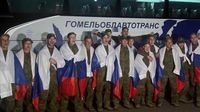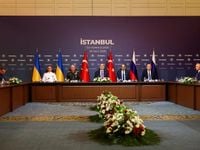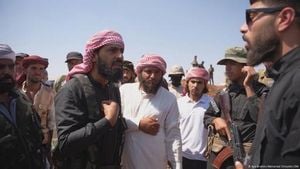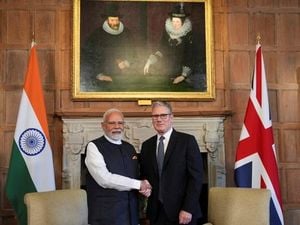In a brief but significant meeting in Istanbul on Wednesday, July 23, 2025, Russia and Ukraine resumed their third round of peace talks, aiming to end the devastating conflict that erupted more than three years ago with Russia's 2022 invasion of Ukraine. Despite hopes for progress, the two sides remain far apart on key issues, particularly a ceasefire and a potential summit between their leaders.
Ukrainian President Volodymyr Zelenskyy emphasized the importance of these talks ahead of their start, stating that the goal was to achieve a ceasefire and ultimately end the war Ukraine never wanted. He also highlighted the critical humanitarian issues on the table, including the release of Ukrainian civilians and children held by Russia. Zelenskyy proposed a leaders’ summit to make peace more accessible and tangible, underscoring the need for direct dialogue at the highest levels.
On the ground in Istanbul, the talks lasted only 40 minutes, making them the shortest yet in this series of negotiations. Ukraine's chief delegate, Rustem Umerov, acknowledged progress on the humanitarian front but lamented the lack of advancement toward halting hostilities. "We have progress on the humanitarian track, with no progress on a cessation of hostilities," he said. Umerov proposed a meeting before the end of August between Zelenskyy and Russian President Vladimir Putin, adding, "By agreeing to this proposal, Russia can clearly demonstrate its constructive approach."
However, Russia's chief delegate, Vladimir Medinsky, took a more cautious stance. He insisted that any leaders’ meeting should focus on signing an agreement rather than reopening negotiations from scratch. Medinsky called for a series of short ceasefires, lasting 24 to 48 hours, to allow the retrieval of bodies, contrasting sharply with Ukraine's demand for an immediate and much longer ceasefire. He also confirmed that the negotiators agreed to exchange at least 1,200 more prisoners of war from each side and that Russia had offered to hand over another 3,000 Ukrainian bodies.
One of the most sensitive issues discussed was the fate of Ukrainian children. Kyiv accuses Russia of abducting at least 19,000 children during the conflict, a charge Moscow denies. Medinsky stated that Russia is working through a list of 339 names provided by Ukraine and claimed that some children have already been returned. "Work is under way on the rest. If their legal parents, close relatives, representatives are found, these children will immediately return home," he said. Umerov stressed Kyiv's insistence on the release of civilians, including children, as a non-negotiable priority.
The talks in Istanbul come amid mounting international pressure, especially from U.S. President Donald Trump, who has threatened severe new sanctions on Russia and countries buying its exports if a peace deal is not reached within 50 days. Trump’s ultimatum, issued just over a week before the talks, has not yet yielded tangible results. Kremlin spokesperson Dmitry Peskov downplayed expectations, describing the negotiations as "very difficult" and warning that no breakthroughs or miracles should be expected. "We intend to pursue our interests during this complicated settlement," he said.
Russia continues its military offensive despite the diplomatic efforts. On the day of the talks, the Russian Defense Ministry announced the capture of Varachyne in Ukraine's northeastern Sumy region, just 6 kilometers from the border. Meanwhile, Russian shelling in the southern city of Kherson killed a 66-year-old woman and injured three others, including two teenagers. The Ukrainian Air Force reported that Moscow launched 71 drones and decoys overnight, intercepting or shooting down 45 of them.
Against this backdrop, Ukrainian authorities celebrated a significant humanitarian development: the retrieval of over 1,000 prisoners of war from Russia as part of the exchange agreed upon in Istanbul. Many had been imprisoned for over three years. President Zelenskyy hailed the return as a moment of joy for thousands of families and promised comprehensive support and medical care for the freed defenders. "Bringing all our people back is a priority for the state," he declared.
Despite these prisoner exchanges and humanitarian gestures, the core issues dividing the two sides remain unresolved. Russia's demands include an end to Ukraine's NATO ambitions, a neutered Ukrainian military, and formal ceding of territory claimed by Russia. Ukraine, on the other hand, insists on its sovereignty and territorial integrity, rejecting any conditions that would legitimize Russian claims.
In a notable diplomatic proposal, Ukraine suggested expanding the peace talks to include a summit featuring Presidents Zelenskyy and Putin, alongside President Trump and Turkish President Recep Tayyip Erdogan, by the end of August. The idea is to leverage international leadership to push for a lasting peace agreement. However, Russian officials have indicated that such a meeting would only be possible after substantial progress is made on the ground.
Meanwhile, the political climate in Kyiv remains tense. Thousands of Ukrainians protested against recent legislation signed by Zelenskyy that curtails the independence of key anti-corruption agencies, a move that has drawn criticism from European allies concerned about Ukraine's EU aspirations. Zelenskyy vowed to submit a new bill preserving the agencies' independence in response to public outcry.
On the international front, Germany's Foreign Minister Johann Wadephul expressed concern that the anti-corruption law changes could hamper Ukraine's path to EU membership. German Defense Minister Boris Pistorius urged the U.S. administration to provide clear assurances regarding the delivery and replacement of Patriot missile defense systems to Ukraine, highlighting the delicate balance NATO allies must maintain while supporting Kyiv.
Adding to the complex geopolitical landscape, Ukrainian authorities arrested the suspected operator of a major Russian-language cybercrime platform in a joint operation with French authorities and Europol. This arrest marks a significant blow against cybercrime networks allegedly facilitating criminal activities across borders.
As the conflict drags on, voices like historian Anne Applebaum emphasize the necessity of arming Ukraine to achieve peace, arguing that without strong defense capabilities, negotiations may falter. Conversely, the Kremlin remains steadfast, with analysts suggesting it sees limited value in antagonizing the U.S. further, given shifting dynamics in American support.
In sum, the recent talks in Istanbul represent a microcosm of the broader struggle: humanitarian progress intertwined with deep political and military divisions. While prisoner exchanges bring hope and relief, the path to a ceasefire and lasting peace remains fraught with obstacles. The world watches closely as these negotiations continue, with the lives of millions hanging in the balance.





